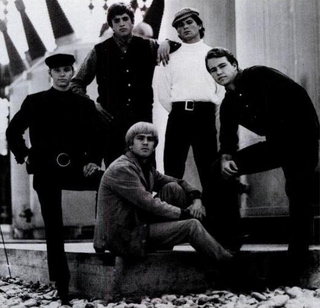
The Electric Prunes are an American psychedelic rock band, formed in Los Angeles, California, in 1965. Much of the band's music was, as music historian Richie Unterberger described it, possessed of "an eerie and sometimes anguished ambiance." Their most successful material was by songwriters Annette Tucker and Nancie Mantz, though the group also penned their own songs. Incorporating psychedelia and elements of embryonic electronic rock, the band's sound was marked by innovative recording techniques with fuzz-toned guitars and oscillating sound effects. In addition, guitarist Ken Williams' and singer James Lowe's concept of "free-form garage music" provided the band with a richer sonic palette and exploratory lyrical structure than many of their contemporaries.

"Mr. Tambourine Man" is a song written by Bob Dylan, released as the first track of the acoustic side of his March 1965 album Bringing It All Back Home. The song's popularity led to Dylan recording it live many times, and it has been included in multiple compilation albums. It has been translated into other languages and has been used or referenced in television shows, films, and books.
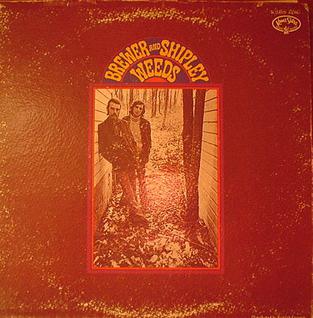
Weeds was the second album by Brewer & Shipley and was released in 1969. The album was recorded at Golden State Recorders in San Francisco and produced by Nick Gravenites using the pseudonym "Nicky Gravy". Gravenites assembled a group of highly respected musicians for the album recording sessions, including guitarist Mike Bloomfield, bassist John Kahn, pedal steel guitarist Red Rhodes, violinist Richard Greene and keyboardists Mark Naftalin and Nicky Hopkins.

ST11261 (1974) was the sixth album released by Brewer & Shipley.

Brewer & Shipley are an American folk rock duo who enjoyed their peak success in the late 1960s through the 1970s. The duo consisted of singer-songwriters Mike Brewer and Tom Shipley. They were known for their intricate guitar work, vocal harmonies, and socially conscious lyrics which reflected the concerns of their generation – especially the Vietnam War, and the struggles for personal and political freedom. Their greatest commercial success was the song "One Toke Over the Line" from their 1970 album Tarkio. They had two other singles on the Billboard charts: "Tarkio Road" (1970) and "Shake Off The Demon" (1971). They continue to perform, both separately and together, usually in the Midwest United States.

Michael Brewer is an American musician. He and Tom Shipley were the music duo Brewer & Shipley.

Flowers is the second compilation album by the Rolling Stones, released in June 1967. The group recorded the songs at various studios dating back to 1965. Three of the songs had never been released: "My Girl", "Ride On, Baby" and "Sittin' on a Fence", the first of which was recorded in May 1965 during the sessions for "(I Can't Get No) Satisfaction", and the other two of which were recorded in December 1965 during the first lot of Aftermath sessions. The rest of the album tracks either appeared as singles or had been omitted from the American versions of Aftermath and Between the Buttons.

The United States of America is the only studio album by American rock band the United States of America. Produced by David Rubinson, it was released in 1968 by Columbia Records. The album combined rock and psychedelia with then-uncommon electronic instrumentation and experimental composition, along with an approach reflecting an anti-establishment, leftist political stance.
"Don't Back Down" is a song by the American rock band the Beach Boys and the final track on their 1964 album All Summer Long. Written by Brian Wilson and Mike Love, the lyrics describe a group of surfers who "don't back down from that wave", explaining that they "gotta be a little nuts" to show the girls "who's got guts". It was the group's last surfing-themed song until 1968's "Do It Again".

"Salt Lake City" is a song written by Brian Wilson and Mike Love for the American rock band The Beach Boys. It was released on their 1965 album Summer Days .
Ultimate Spinach was a short-lived American psychedelic rock band from Boston, Massachusetts which was formed in 1967. In terms of style and national recognition, the band was one of the most prominent musical acts to emerge from the "Bosstown Sound", which was a marketing campaign posing as a regional attempt to compete with the San Francisco Sound. During the group's existence, they released three albums, with their self-titled debut the most commercially successful.

It's Everly Time is the third studio album by American singing duo The Everly Brothers, released in 1960. It peaked at No. 9 on the Billboard Pop albums chart. It's Everly Time was their first album on Warner Bros. after leaving the independent label Cadence. Though Warner Brothers was based in Los Angeles, they continued to record in Nashville with top session players, laying down all the dozen tracks over the course of five sessions in March 1960.
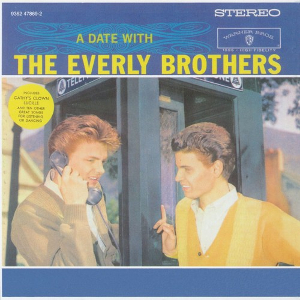
A Date with the Everly Brothers is the fourth studio album by American singing duo the Everly Brothers, released in 1960. It peaked at No. 9 on the Billboard Pop albums charts and reached No. 3 in the UK.

Evergreen, Vol. 2 is the second album from the Stone Poneys, released five months after The Stone Poneys. It was the most commercially successful of the Stone Poneys' three studio albums.

The Stone Poneys is the debut studio album by the Stone Poneys; other than the single of "So Fine" in 1965, this album marks the first official recordings by Linda Ronstadt.

Ira and Charlie is an album by American country music duo The Louvin Brothers, released in 1958.

H. P. Lovecraft II is the second album by the American psychedelic rock band H. P. Lovecraft and was released in September 1968 on Philips Records. As with their debut LP, the album saw the band blending psychedelic and folk rock influences, albeit with a greater emphasis on psychedelia than on their first album. H. P. Lovecraft II failed to sell in sufficient quantities to reach the Billboard Top LPs chart or the UK Albums Chart, despite the band being a popular act on the U.S. psychedelic concert circuit. Legend has it that the album was the first major label release to have been recorded by musicians who were all under the influence of LSD.
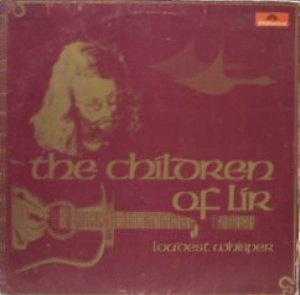
The Children of Lir is the debut album by Irish folk rock/progressive folk group Loudest Whisper. It is the studio adaption of the musical of the same name that was performed in Fermoy, Ireland in 1973. The album was released on LP record in Ireland by Polydor Records in 1974 in a limited edition of 500 copies.

The Poor were an American rock band from Los Angeles, California who were active in the 1960s. Included in their roster were Randy Meisner, who went go on to achieve fame with the Eagles and Poco in the 1970s, as well as Allen Kemp and Pat Shanahan, who later joined New Riders of the Purple Sage.
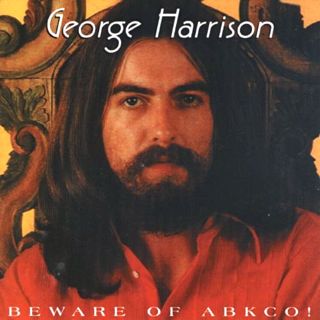
Beware of ABKCO! is a bootleg album of songs performed by English rock musician George Harrison in May 1970. It contains songs that were under consideration for Harrison's triple album All Things Must Pass, his first release as a solo artist following the break-up of the Beatles. The performances were taped in a single session at Abbey Road Studios in London, on 27 May 1970, for the benefit of Harrison's co-producer, Phil Spector. Seven of the fifteen songs were subsequently recorded formally for inclusion on All Things Must Pass, as was "Everybody, Nobody" after Harrison reworked it as "Ballad of Sir Frankie Crisp ". From its 1994 release by Strawberry Records, the bootleg provided the only available record of five songs that Harrison never revisited during his career. Among these is a 1968 collaboration with Bob Dylan titled "Nowhere to Go". All fifteen songs were officially released in August 2021, as part of the Uber and Super deluxe editions of the All Things Must Pass: 50th Anniversary box set.


















